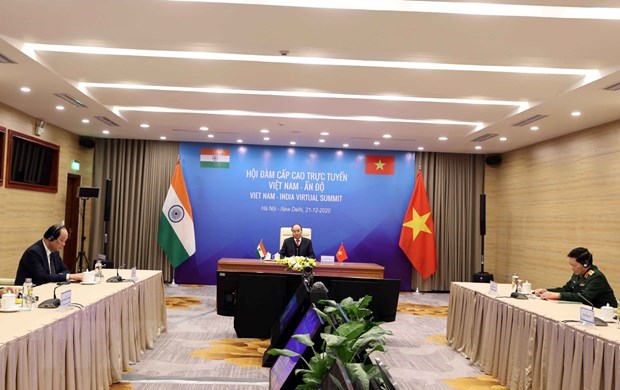 Politics & Law
Politics & Law


|
| Prime Minister Nguyễn Xuân Phúc and his Indian counterpart Narendra Modi co-chair the Việt Nam-India Virtual Summit on December 21. — VNA/VNS Photo |
HÀ NỘI — Prime Minister Nguyen Xuân Phúc and his Indian counterpart Narendra Modi discussed wide-ranging bilateral, regional and global issues and set forth the Joint Vision for Peace, Prosperity and People to guide the future development of Việt Nam - India Comprehensive Strategic Partnership, during a virtual summit on Monday.
The leaders reaffirmed their wish to advance the comprehensive strategic partnership and agreed to increase high-level delegation exchanges as well as co-operation mechanisms between the two countries.
They said the enhanced defence and security ties would be an important factor for stability in the Indo-Pacific region. The PMs, therefore, agreed to promote military exchanges and step up collaboration in the military industry, using India’s defence packages for Việt Nam.
The two sides will share information and co-operate in UN peacekeeping operations, while tightening their ties in security through existing dialogue mechanisms to cope with traditional and non-traditional maritime security threats and cybersecurity.
Stressing the link between security and prosperity, the leaders reiterated the significance of maintaining peace, stability, security and freedom of navigation and aviation in the East Sea, peacefully addressing disputes in line with international law, particularly the 1982 United Nations Convention on the Law of the Sea, and not using or threatening to use force.
They called for more efforts to realise the Declaration on the Conduct of Parties in the East Sea (DOC), and result-oriented negotiations to soon complete a Code of Conduct in the East Sea (COC) in accordance with international law, especially the UNCLOS, not affecting legal rights and interests of all countries, including those not engaging in negotiations.
The leaders emphasised the importance of ASEAN-India co-operation to maintaining peace, security and prosperity in the region.
The two sides will also intensify multi-lateral and regional collaboration, including in the United Nations, ASEAN-led mechanisms and Mekong Sub-regional co-operation.
The two sides will step up joint efforts to build a strong consensus for early adoption of the Comprehensive Convention on International Terrorism (CCIT).
The two sides will work towards reliable, efficient and resilient supply chains, and will promote human-centred globalisation. They will strive to achieve the target of US$15 billion of trade turnover and will set higher levels of ambition for bilateral trade based on a concrete plan of action and new supply chains in each other’s country.
Both sides will upgrade bilateral economic ties through facilitating long-term investment in each other’s economy, boosting joint ventures, taking part in new global value chains, encouraging regional e-commerce and enhancing market access capacity.
The two sides will exploit their similarity in goals, such as India’s digital India and Viet Nam’s digital society vision, as well as promote co-operation in the fields of civil nuclear and space technology, transformation technologies in IT and communications, ocean sciences, sustainable agriculture, water resources management, comprehensive healthcare, vaccine and pharmaceuticals, smart urban centres and start-ups.
They will work together on new energy, renewable energy and technologies adaptive to climate change.
India will continue supporting capacity enhancement for Vietnamese localities, including the expansion of India’s Quick Impact Project (QIP) programme within the framework of Mekong-Ganga river co-operation and other programmes of the Indian Technical and Economic Cooperation (ITEC) and e-ITEC in various areas.
Emphasising the long-lasting connection in culture and history between Vietnam and India, the two sides will boost cultural heritage studies, with co-operation in cultural heritage conservation considered a main pillar in the two countries’ development partnership.
They will also make efforts to promote people-to-people exchange by increasing direct flights and facilitating travel with the simplification of visa procedures and tourism promotion.
The two PMs expressed their belief that the joint vision will be a basis for a new era in the Viet Nam – India Comprehensive Strategic Partnership. To realise the vision, the two sides will revise action programmes for each stage, starting from 2021-23. — VNS




